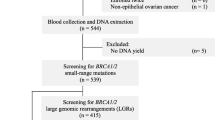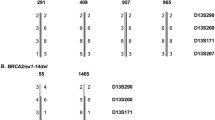Abstract
The distribution of BRCA1/2 germline mutations in breast/ovarian cancer (BC/OC) families varies among different populations. In the Chilean population, there are only two reports of mutation analysis of BRCA1/2, and these included a low number of BC and/or OC patients. Moreover, the prevalence of BRCA1/2 genomic rearrangements in Chilean and in other South American populations is unknown. In this article, we present the mutation-detection data corresponding to a set of 326 high-risk families analyzed by conformation-sensitive gel electrophoresis and heteroduplex analysis. To determine the contribution of BRCA1/2 LGRs in Chilean BC patients, we analyzed 56 high-risk subjects with no pathogenic BRCA1/2 point mutations. Germline BRCA1/2 point mutations were found in 23 (7.1%) of the 326 Chilean families. Families which had at least three BC and/or OC cases showed the highest frequency of mutations (15.9%). We identified 14 point pathogenic mutations. Three recurrent mutations in BRCA1 (c.187_188delAG, c.2605_2606delTT, and c.3450_3453delCAAG) and three in BRCA2 (c.4969_4970insTG, c.5374_5377delTATG, and c.6503_6504delTT) contributed to 63.6 and 66.7% of all the deleterious mutations of each gene, which may reflect the presence of region-specific founder effects. Taken together BRCA1/2 recurrent point mutations account for 65.2% (15/23) of the BRCA1/2 (+) families. No large deletions or duplications involving BRCA1/2 were identified in a subgroup of 56 index cases negative for BRCA1/2 point mutations. Our study, which is the largest conducted to date in a South American population, provides a comprehensive analysis on the type and distribution of BRCA1/2 mutations and allelic variants.
Similar content being viewed by others
References
Jemal A, Siegel R, Ward E, Hao Y, Xu J, Thun MJ (2009) Cancer statistics, 2009. CA Cancer J Clin 59:225–249
Peralta O, Jorquera A, Rencoret C, Castillo CD, Solé J, Campodónico Y (1995) Cáncer de mama: resultados del programa de pesquisa y tratamiento del Servicio de Salud Central. Rev Chil Obstet Ginecol 60:417–425
Departamento de Estadísticas e Información en Salud (2009). Mortalidad en mujeres, Chile, 2006. Ministerio de Salud de Chile. http://deis.minsal.cl/deis/salidas06/causas06.asp?temp=TODAS_EDADES_MUJ.htm. Accessed 14 May 2010
Prieto M (2006) Situación epidemiológica del cáncer de mama en Chile 1994–2003. Rev Med Clin Condes 17:142–148
Easton D (2002) Familial risks of breast cancer. Breast Cancer Res 4:179–181
Wooster R, Weber BL (2003) Breast and ovarian cancer. New Engl J Med 348:2339–2347
Miki Y, Swensen J, Shattuck-Eidens D, Futreal PA, Harshman K, Tavtigian S, Liu Q, Cochran C, Bennett LM, Ding W et al (1994) A strong candidate for the breast and ovarian cancer susceptibility gene BRCA1. Science 266:66–71
Tavtigian SV, Simard J, Rommens J, Couch F, Shattuck-Eidens D, Neuhausen S, Merajver S, Thorlacius S, Offit K, Stoppa-Lyonnet D et al (1996) The complete BRCA2 gene and mutations in chromosome 13q-linked kindreds. Nat Genet 12:333–337
Jara L, Ampuero S, Santibáñez E, Seccia L, Rodríguez J, Bustamante M, Martínez V, Catenaccio A, Lay-Son G, Blanco R, Reyes J (2006) BRCA1 and BRCA2 mutations in a South American population. Cancer Genet Cytogenet 166:36–45
Gallardo M, Silva A, Rubio L, Alvarez C, Torrealba C, Salinas M, Tapia T, Faundez P, Palma L, Riccio ME, Paredes H, Rodriguez M, Cruz A, Rousseau C, King MC, Camus M, Alvarez M, Carvallo P (2006) Incidence of BRCA1 and BRCA2 mutations in 54 Chilean families with breast/ovarian cancer, genotype-phenotype correlations. Breast Cancer Res Treat 95:81–87
Chomczynski P, Sacchi N (2006) The single-step method of RNA isolation by acid guanidinium thiocyanate-phenol-chloroform extraction: twenty-something years on. Nat Protoc 1:581–585
den Dunnen JT, Antonarakis SE (2000) Mutation nomenclature extensions and suggestions to describe complex mutations: a discussion. Hum Mutat 15:7–12
Ruiz-Flores P, Sinilnikova OM, Badzioch M, Calderon-Garciduenas AL, Chopin S, Fabrice O, Gonzalez-Guerrero JF, Szabo C, Lenoir G, Goldgar DE, Barrera-Saldana HA (2002) BRCA1 and BRCA2 mutation analysis of early-onset and familial breast cancer cases in Mexico. Hum Mutat 20:474–475
Torres D, Rashid MU, Gil F, Umana A, Ramelli G, Robledo JF, Tawil M, Torregrosa L, Briceno I, Hamann U (2007) High proportion of BRCA1/2 founder mutations in Hispanic breast/ovarian cancer families from Colombia. Breast Cancer Res Treat 103:225–232
Fackenthal JD, Olopade OI (2007) Breast cancer risk associated with BRCA1 and BRCA2 in diverse populations. Nat Rev Cancer 7:937–948
Diez O, Osorio A, Duran M, Martinez-Ferrandis JI, de la Hoya M, Salazar R, Vega A, Campos B, Rodriguez-Lopez R, Velasco E et al (2003) Analysis of BRCA1 and BRCA2 genes in Spanish breast/ovarian cancer patients: a high proportion of mutations unique to Spain and evidence of founder effects. Hum Mutat 22:301–312
Jara L, Dubois K, Gaete D, de Mayo T, Ratkevicius N, Bravo T, Margarit S, Blanco R, Gomez F, Waugh E et al (2010) Variants in DNA double-strand break repair genes and risk of familial breast cancer in a South American population. Breast Cancer Res Treat 122(3):813–822. doi:10.1007/s10549-009-0709-2
Spain BH, Larson CJ, Shihabuddin LS, Gage FH, Verma IM (1999) Truncated BRCA2 is cytoplasmic: implications for cancer-linked mutations. Proc Natl Acad Sci USA 96:13920–13925
Hakansson S, Johannsson O, Johansson U, Sellberg G, Loman N, Gerdes AM, Holmberg E, Dahl N, Pandis N, Kristoffersson U, Olsson H, Borg A (1997) Moderate frequency of BRCA1 and BRCA2 germ-line mutations in Scandinavian familial breast cancer. Am J Hum Genet 60:1068–1078
Cruz-Coke R (1976) Origen y evolución étnica de la población chilena. Rev Med Chile 101:365–368
Valenzuela CY, Harb Z (1977) Socioeconomic assortative mating in Santiago, Chile: as demonstrated using stochastic matrices of mother–child relationships applied to ABO blood groups. Soc Biol 24:225–233
Valenzuela CY, Acuña M, Harb Z (1987) Gradiente sociogenético en la población chilena. Rev Med Chile 115:295–299
Valenzuela CY (1988) On sociogenetic clines. Ethol Sociobiol 9:259–268
Blesa JR, Garcia JA, Ochoa E (2000) Frequency of germ-line BRCA1 mutations among Spanish families from a Mediterranean area. Hum Mutat 15:381–382
Diez O, Gutierrez-Enriquez S, Balmana J (2010) Heterogeneous prevalence of recurrent BRCA1 and BRCA2 mutations in Spain according to the geographical area: implications for genetic testing. Fam Cancer 9:187–191
Infante M, Duran M, Esteban-Cardenosa E, Miner C, Velasco E (2006) High proportion of novel mutations of BRCA1 and BRCA2 in breast/ovarian cancer patients from Castilla-Leon (central Spain). J Hum Genet 51:611–617
Neuhausen SL, Mazoyer S, Friedman L, Stratton M, Offit K, Caligo A, Tomlinson G, Cannon-Albright L, Bishop T, Kelsell D et al (1996) Haplotype and phenotype analysis of six recurrent BRCA1 mutations in 61 families: results of an international study. Am J Hum Genet 58:271–280
Tonin PN, Mes-Masson AM, Futreal PA, Morgan K, Mahon M, Foulkes WD, Cole DE, Provencher D, Ghadirian P, Narod SA (1998) Founder BRCA1 and BRCA2 mutations in French Canadian breast and ovarian cancer families. Am J Hum Genet 63:1341–1351
Infante M, Duran M, Acedo A, Perez-Cabornero L, Sanz DJ, Garcia-Gonzalez M, Beristain E, Esteban-Cardenosa E, de la Hoya M, Teule A et al (2010) BRCA1 5272–1G>A and BRCA2 5374delTATG are founder mutations of high relevance for genetic counselling in breast/ovarian cancer families of Spanish origin. Clin Genet 77:60–69
Weitzel JN, Lagos V, Blazer KR, Nelson R, Ricker C, Herzog J, McGuire C, Neuhausen S (2005) Prevalence of BRCA mutations and founder effect in high-risk Hispanic families. Cancer Epidemiol Biomarkers Prev 14:1666–1671
Shivji MK, Venkitaraman AR (2004) DNA recombination, chromosomal stability and carcinogenesis: insights into the role of BRCA2. DNA Repair (Amst) 3:835–843
Powell SN, Willers H, Xia F (2002) BRCA2 keeps Rad51 in line. High-fidelity homologous recombination prevents breast and ovarian cancer? Mol Cell 10:1262–1263
Pellegrini L, Yu DS, Lo T, Anand S, Lee M, Blundell TL, Venkitaraman AR (2002) Insights into DNA recombination from the structure of a RAD51-BRCA2 complex. Nature 420:287–293
Hansen TO, Jonson L, Albrechtsen A, Andersen MK, Ejlertsen B, Nielsen FC (2009) Large BRCA1 and BRCA2 genomic rearrangements in Danish high risk breast-ovarian cancer families. Breast Cancer Res Treat 115:315–323
Sluiter MD, van Rensburg EJ (2010) Large genomic rearrangements of the BRCA1 and BRCA2 genes: review of the literature and report of a novel BRCA1 mutation. Breast Cancer Res Treat. doi: 10.1007/s10549-010-0817-z
Laurila E, Syrjakoski K, Holli K, Kallioniemi A, Karhu R (2005) Search for large genomic alterations of the BRCA1 gene in a Finnish population. Cancer Genet Cytogenet 163:57–61
Pylkas K, Erkko H, Nikkila J, Solyom S, Winqvist R (2008) Analysis of large deletions in BRCA1, BRCA2 and PALB2 genes in Finnish breast and ovarian cancer families. BMC Cancer 8:146
Lahti-Domenici J, Rapakko K, Paakkonen K, Allinen M, Nevanlinna H, Kujala M, Huusko P, Winqvist R (2001) Exclusion of large deletions and other rearrangements in BRCA1 and BRCA2 in Finnish breast and ovarian cancer families. Cancer Genet Cytogenet 129:120–123
Moisan AM, Fortin J, Dumont M, Samson C, Bessette P, Chiquette J, Laframboise R, Lepine J, Lesperance B, Pichette R et al (2006) No Evidence of BRCA1/2 genomic rearrangements in high-risk French-Canadian breast/ovarian cancer families. Genet Test 10:104–115
Pietschmann A, Mehdipour P, Mehdipour P, Atri M, Hofmann W, Hosseini-Asl SS, Scherneck S, Mundlos S, Peters H (2005) Mutation analysis of BRCA1 and BRCA2 genes in Iranian high risk breast cancer families. J Cancer Res Clin Oncol 131:552–558
Weitzel JN, Lagos VI, Herzog JS, Judkins T, Hendrickson B, Ho JS, Ricker CN, Lowstuter KJ, Blazer KR, Tomlinson G, Scholl T (2007) Evidence for common ancestral origin of a recurring BRCA1 genomic rearrangement identified in high-risk Hispanic families. Cancer Epidemiol Biomarkers Prev 16:1615–1620
Del Valle J, Feliubadalo L, Nadal M, Teule A, Miro R, Cuesta R, Tornero E, Menendez M, Darder E, Brunet J, Capella G, Blanco I, Lazaro C (2009) Identification and comprehensive characterization of large genomic rearrangements in the BRCA1 and BRCA2 genes. Breast Cancer Res Treat 122(3):733–743. doi:10.1007/s10549-009-0613-9
Lim YK, Lau PT, Ali AB, Lee SC, Wong JE, Putti TC, Sng JH (2007) Identification of novel BRCA large genomic rearrangements in Singapore Asian breast and ovarian patients with cancer. Clin Genet 71:331–342
Seong MW, Cho S, Noh DY, Han W, Kim SW, Park CM, Park HW, Kim SY, Kim JY, Park SS (2009) Comprehensive mutational analysis of BRCA1/BRCA2 for Korean breast cancer patients: evidence of a founder mutation. Clin Genet 76:152–160
Acknowledgments
The authors thank the many families who participated in the research studies described in this article. We acknowledge the Breast Cancer Group of CONAC: Maria Teresa Barrios, Angelica Soto, Rossana Recabbarren, and Leticia Garcia; and Lorena Seccia for her technical assistance. We also acknowledge the financial support of Vicerrectoria de Investigacion y Desarrollo (VID) Universidad de Chile (ENL 10/04) and Corporacion Nacional del Cancer (CONAC). This study has been partially supported by a UICC International Cancer Technology Transfer Fellowship (ICR/08/152) and with Federal funds from the National Cancer Institute, National Institutes of Health under Contract NO2-CO-41101, and partially supported by a grant of the “Fondo de Investigación Sanitaria” from the Spanish Health Ministry: FIS 05/2181.
Conflict of interest
The authors declare that they have no competing interests.
Author information
Authors and Affiliations
Corresponding authors
Additional information
Orland Diez and Lilian Jara contributed equally to this study.
Rights and permissions
About this article
Cite this article
Gonzalez-Hormazabal, P., Gutierrez-Enriquez, S., Gaete, D. et al. Spectrum of BRCA1/2 point mutations and genomic rearrangements in high-risk breast/ovarian cancer Chilean families. Breast Cancer Res Treat 126, 705–716 (2011). https://doi.org/10.1007/s10549-010-1170-y
Received:
Accepted:
Published:
Issue Date:
DOI: https://doi.org/10.1007/s10549-010-1170-y




